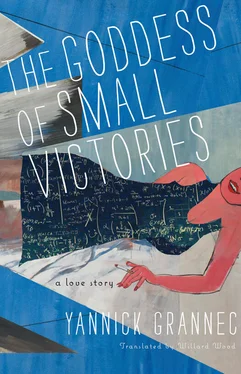I’d banished dreams of a big church wedding with Vienna’s high society in attendance — I’d worn white once already. But this wedding, with its few guests, performed like a tiresome formality, had a faintly sad smell to it. Crossing the entrance hall, I saw a tired woman in the mirror. Was this the young bride-to-be? I took out my bobby pins and fluffed my hair. “Come on, girl, consider yourself happy and put the best face on it. Make the most of this moment, Frau Gödel!” I dressed before waking him with a kiss.
He had given me a free hand with the wedding. I was used to that kind of decision making: “Take care of the details!” I was logistics, and logistics I would remain. Kurt was deeply absorbed in preparing his next course of lectures at Notre Dame University in the United States. After teaching for a year in Vienna, he had been given his university’s permission to teach elsewhere. He’d accepted an invitation from his friend Karl Menger in Indiana and another from Abraham Flexner at Princeton. His departure had been planned as far back as January, despite the uncertainties of this chaotic time. Kurt didn’t seem to worry about it. After a few months of euphoric concentration, reassured of having recovered his ability to work, he looked forward eagerly to leaving Austria.
Our sudden decision to marry surprised my own family and the few close friends who knew about our affair. The “festivities” would not strain our budget unduly: the civil ceremony would be followed by a simple meal, attended by my parents, my sisters, and Kurt’s brother, Rudolf. The witnesses would be Karl Gödel, a cousin of Kurt’s father, and Hermann Lortzing, an accountant friend. A person’s absence can, in some cases, be more humiliating even than their hostile presence: his mother declined our invitation. His closest colleagues, for their part, had almost all left Europe.
We took the tram and met our friends in front of the town hall. We had made lunch reservations at a tavern right next to the government building, not far from the university and the cafés where Kurt had spent so many hours. It was the kind of detail Kurt appreciated: he would quit his bachelor student life and enter the married state all in the same neighborhood, without disruptions to his routine. Not that his familiar universe hadn’t changed. The façades were plastered with Nazi flags, and the heavy boots that tromped constantly through the buildings had made most of his friends flee. We were clinging, I realize now, to a Vienna that had vanished. It would take us both a while longer to realize it.
We led our meager procession up the steps of the town hall. My parents and my sisters, who had overdressed, felt awkward in the presence of the stolid, bourgeois Rudolf. They kept their silence.
I had invited neither Anna nor Lieesa to my wedding. I would have liked to query redheaded Anna about my blue velvet coat, in which I’d been caught once or twice in a downpour. She might have come with me to choose the little hat I wore, absolutely simple, gray with a ribbon, my one extravagance given our precarious finances. I borrowed a brooch from my sister, and I could have tapped Lieesa for her husband-catching stole. It had brought me luck, before the moths attacked it, as they attacked our memories. But my girlfriends inhabited two separate compartments of my life that history didn’t allow me to bring together. Not inviting Lieesa was to betray my youth. Not inviting Anna was to betray my gratitude toward her. But it was unimaginable, and in fact dangerous, to bring Anna, my Jewish friend, in contact with Lieesa. And both Kurt and I wanted the ceremony to gloss over our tricky pasts. Consenting finally to give me his name, Kurt had also passed on to me his worst feature, his inability to make difficult decisions — when, that is, the choice involved flesh-and-blood creatures and not mathematical symbols. Anna had made no objections; she understood. I brought her a slice of wedding cake and some candied almonds for her boy. Lieesa no longer spoke to me and hadn’t for some time. “Frau Gödel.” Now I was upper-crust .
In a few minutes on September 20, 1938, after ten years of shameful cohabitation, I, Adele Thusnelda Porkert, no profession, daughter of Joseph and Hildegarde Porkert, was married to Dr. Kurt Friedrich Gödel, son of Rudolf Gödel and Marianne Gödel, née Handschuh. I removed my white gloves to sign the register. Then Kurt took the fountain pen and flashed one of his contrite little smiles at me. He kissed me, looking away from his brother. I readjusted the flower in his buttonhole. I was happy. A tiny victory, but a victory all the same. The circumstances didn’t matter, the old coat, the unanswered questions. Why now? Why so quickly, two weeks before his departure? Kurt’s mother, who had stayed in Brno, filled the echoing room with her unspoken disapproval. Marianne Gödel had given her consent but not her blessing. At the same time, she had a good excuse: the Sudeten crisis made it difficult to travel. In palmier times, she still would not have made the trip. In palmier times, Kurt would not have married me.
Twenty years later, in the flowered courtyard of a church in Princeton, I would cry at the wedding of a radiant stranger. Not because I was jealous of her puffy white dress, her prosperous and self-congratulatory family, or her friends wrapped in lavender satin — I cried over the hope that I had harbored at my own wedding. Like this unknown bride, I had followed the tradition of “Something old, something new, something borrowed, something blue, and a silver sixpence in her shoe.” I was in fact carrying something new under my blue vest — a little of him, a little of me. He was unaware of it as he signed the register. He was also unaware that I would not accompany him to the United States. This hope of mine, how could I give it short shrift? How could I get on a train, and then a boat, and risk losing the child when, at the age of thirty-nine, it was probably my last chance? Old Lady Gödel would likely consider a miscarriage the unfortunate but justly deserved punishment due to the divorcée who put the grapple on her son. But Kurt had always avoided the subject. Fatherhood was not part of his program. “Take care of the details,” he had said.
I let him run around and send telegrams in every direction trying to raise funds for a second ticket. His egotism and blindness were vast. He wanted me with him in the United States because he didn’t feel he could stand another academic year as an overaged bachelor student. The only way for us both to get visas was for him to marry me. I didn’t have any illusions. He was not troubled by the course of history, not terrified at leaving his mother alone in Czechoslovakia, and he was hardly concerned about our dicey finances. He had his work, his needs as a man, and the rest mattered very little. What were the world’s upheaval or the jeremiads of a woman in comparison with the infinity of mathematics? Kurt always placed himself outside the game. Here and now was an unpleasant point in space-time, an imperative I was assigned to handle so that we might survive.
He briefly considered emigrating officially but dismissed it without serious thought. Oskar Morgenstern and Karl Menger, who had been in the United States for several months, wrote that they planned to settle there. They urged him to weigh the possibility of expatriate life. I started to think about it. If he married me, Princeton’s invitation gave us an opportunity to go, leaving everything behind. I made two lists. Here: my family; his mother, who had taken refuge in a defeated Czechoslovakia; his academic career, already on a solid footing, and a university that still believed in him; his brother, who was our only financial guarantor; and a political situation that, while explosive, did not threaten us directly. There: his friends; temporary appointments; the unknown. Could we get a two-person visa? How would we live on his modest stipend? What would happen to me in a distant world whose language I did not speak, alone, and dependent on the ups and downs of his mental health? The balance tipped several weeks before our wedding when I started to vomit secretly in the morning. I would stay on in Vienna without him.
Читать дальше












